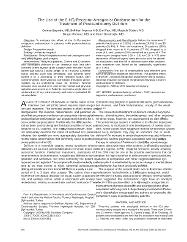| dc.contributor.author | Bayındır, Osman | |
| dc.contributor.author | Akpınar, Belhhan | |
| dc.contributor.author | Can, Erol | |
| dc.contributor.author | Güden, Mustafa | |
| dc.contributor.author | Sönmez, Bingür | |
| dc.contributor.author | Demiroğlu, Cemşid | |
| dc.date.accessioned | 2019-06-27T08:01:06Z | |
| dc.date.available | 2019-06-27T08:01:06Z | |
| dc.date.issued | 2000 | |
| dc.identifier.issn | 1053-0770 | en_US |
| dc.identifier.uri | https://hdl.handle.net/20.500.12469/256 | |
| dc.identifier.uri | https://doi.org/10.1016/S1053-0770(00)90127-7 | |
| dc.description.abstract | Objective:To evaluate the effect of the 5-HT3-receptor antagonist ondansetron in patients with postcardiotomy delirium. Design: Prospective study. Setting: University hospital. Participants: Thirty-five patients who had undergone coronary artery bypass graft surgery. Interventions: Thirty-five patients 23 men and 12 women who developed delirium in the intensive care unit after coronary artery bypass graft surgery were included. Mean patient age was 51.3 years (range 36 to 79 years). A mental status scoring scale was developed and patients were scored 0 to 4 according to their delirium status after confirming that there were no correctable metabolic abnormalities as an underlying cause for delirium. Normal behavior was scored as 0 and severe verbal and physical agitation was scored as 4. Patients received a single dose of ondansetron 8 mg intravenously and were reevaluated 10 minutes later. Measurements and Main Results: Before the treatment 7 patients had a score of 2 (20) | en_US] |
| dc.description.abstract | 10 patients (28.6%) 3 | en_US] |
| dc.description.abstract | and 18 patients (51.4%) 4. After the treatment 28 patients (80%) dropped their score to 0 | en_US] |
| dc.description.abstract | 6 patients (17.1%) dropped to a score of 1 and 1 patient (2.9%) remained at a score of 4. The mean score dropped from 3.20 + 1.01 to 0.29 + 0.75 after treatment. Wilcoxon signed ranks test was used for statistical evaluation and the fall in delirium score after ondansetron treatment was found to be statistically significant (p < 0.001). Conclusions: The use of ondansetron was effective and safe and without important side effects. This positive effect of the 5-HT3-receptor antagonist ondansetron led to speculation that impaired serotonin metabolism may play a role in postcardiotomy delirium. Copyright (C) 2000 by W.B. Saunders Company. | en_US] |
| dc.language.iso | eng | en_US |
| dc.publisher | W.B. Saunders Co Ltd | en_US |
| dc.rights | info:eu-repo/semantics/openAccess | en_US |
| dc.subject | Postcardiotomy delirium | en_US |
| dc.subject | 5-HT3-receptor antagonism | en_US |
| dc.subject | Ondansetron | en_US |
| dc.subject | Serotonin | en_US |
| dc.title | The use of the 5-HT3-receptor antagonist ondansetron for the treatment of postcardiotomy delirium | en_US |
| dc.type | article | en_US |
| dc.identifier.startpage | 288 | en_US |
| dc.identifier.endpage | 292 | |
| dc.relation.journal | Journal of Cardiothoracic and Vascular Anesthesia | en_US |
| dc.identifier.issue | 3 | |
| dc.identifier.volume | 14 | en_US |
| dc.identifier.wos | WOS:000087707000012 | en_US |
| dc.identifier.doi | 10.1016/S1053-0770(00)90127-7 | en_US |
| dc.identifier.scopus | 2-s2.0-0033623968 | en_US |
| dc.institutionauthor | Bayındır, Osman | en_US |
| dc.institutionauthor | Akpınar, Belhhan | en_US |
| dc.institutionauthor | Can, Erol | en_US |
| dc.institutionauthor | Güden, Mustafa | en_US |
| dc.institutionauthor | Sönmez, Bingür | en_US |
| dc.institutionauthor | Demiroğlu, Cemşid | en_US |
| dc.relation.publicationcategory | Makale - Uluslararası Hakemli Dergi - Kurum Öğretim Elemanı | en_US |
| dc.identifier.pmid | 10890483 | en_US |
















